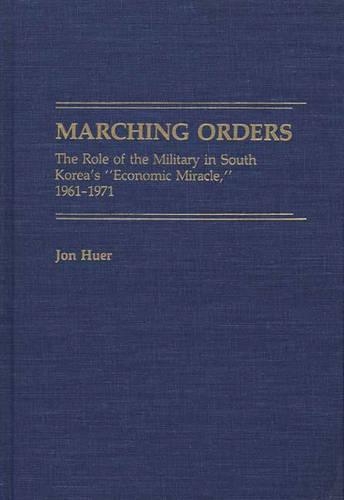
Marching Orders: The Role of the Military in South Korea's Economic Miracle, 1961-1971
(Hardback)
Publishing Details
Marching Orders: The Role of the Military in South Korea's Economic Miracle, 1961-1971
By (Author) Jon H. Huer
Bloomsbury Publishing PLC
Praeger Publishers Inc
7th July 1989
United States
Classifications
Tertiary Education
Non Fiction
Microeconomics
338.95195
Physical Properties
Hardback
235
Description
This modern day rags-to-riches story tells how one of the poorest nations in the world evolved into one of the most technologically advanced. How did South Korea do it The `miracle' that occurred in South Korea was produced, in essence, by military men, many of whom had undergone extensive managerial training in the United States in the preceding decade, who gave `marching orders' to a responsive populace. Marching Orders, a historically factual, yet fast-paced and dramatic `page turner,' chronicles, in five parts, the history and events that led to General Park Chung Hee's 1961 coup d'etat and the transformations in Korean society that followed it during the next decade. Part One surveys Korea prior to 1961--a deprived colony during the Japanese occupation, then a war-devastated, barely industrialized nation whose existence depended heavily on U.S. economic aid. Part Two analyzes the military establishment--a crucial factor in Korea's economic prosperity even today. The military takeover of 1961 and the subsequent establishment of the Supreme Council for National Reconstruction (SCNR) were the turning points for this politically and economically bankrupt nation. These events led to the massive changes which are detailed in Parts Three and Four along with the `rationalization' of the political sphere and the various aspects of economic `rationalization,' including the now-famous New Village Movement, a model of agricultural development for other emerging nations. In Part Five, the role and potential of the military in national development are explained and South Korea is presented as a success story. Indeed, Marching Orders could well serve as a `How To' book for emerging countries. Highly readable, Marching Orders has been written for the generalist without sacrificing scholarship. It will also prove useful to specialists in sociology, political science, economics, and Southeast Asia; to entrepreneurs engaged in trade with South Korea; and to those interested in Third World Development. An excellent addition to the reading lists of courses in development, comparative history, and military-civil cooperation.
Reviews
the book is well written, fast paced, lucid in its narrative and thus highly readable. Its analysis is careful and logical. For all these reasons this volume should be of use to professionals and laymen; Koreans and Americans. It is an excellent addition to the growing literature on South Korea's recent socio-cultural, economic and political development and history.-Journal of Third World Studies
Huer's well-written book traces the socio-economic events that led to the spectacular growth of the Korean economy during the 1960s. Starting with a description of Korea's historical legacy up to the Rhee and Chang administrations, the author explains how the military establishment played a crucial role in the restructuring of Korea's political, social, and economic institutions that contributed to her economic prosperity. The book is properly documented and has a valuable bibliography. Though there are several books available on the subject, this volume is noteworthy for its analytical and lucid discussion of the role of the military in South Korea's economic miracle.' It will be useful to both graduate and undergraduate students studying Asian economic development and also to general readers interested in world affairs.-Choice
"the book is well written, fast paced, lucid in its narrative and thus highly readable. Its analysis is careful and logical. For all these reasons this volume should be of use to professionals and laymen; Koreans and Americans. It is an excellent addition to the growing literature on South Korea's recent socio-cultural, economic and political development and history."-Journal of Third World Studies
"Huer's well-written book traces the socio-economic events that led to the spectacular growth of the Korean economy during the 1960s. Starting with a description of Korea's historical legacy up to the Rhee and Chang administrations, the author explains how the military establishment played a crucial role in the restructuring of Korea's political, social, and economic institutions that contributed to her economic prosperity. The book is properly documented and has a valuable bibliography. Though there are several books available on the subject, this volume is noteworthy for its analytical and lucid discussion of the role of the military in South Korea's economic miracle.' It will be useful to both graduate and undergraduate students studying Asian economic development and also to general readers interested in world affairs."-Choice
Author Bio
JON HUER is Associate Professor in the Department of Sociology and Anthropology at the University of North Carolina at Wilmington. His previous publications include Art, Beauty and Pornography and The Dead End as well as numerous articles.
